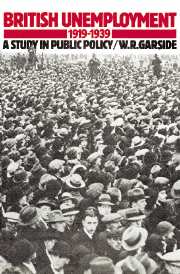Book contents
- Frontmatter
- Contents
- List of tables
- Preface
- Acknowledgements
- PART I INTRODUCTION
- PART II THE LABOUR MARKET UNDER STRAIN
- PART III THE INTERNATIONAL CONTEXT
- PART IV STRUCTURAL UNEMPLOYMENT, INDUSTRY AND THE REGIONS
- PART V MACROECONOMIC POLICY OPTIONS: THEORY AND PRACTICE
- 10 Pricing jobs: the real wage debate and interwar unemployment
- 11 Relief or remedy? The development of public works policy, 1920–1932
- 12 The limits of intervention: budgetary orthodoxy and the reduction of unemployment in the 1920s
- 13 New Deal or no deal? Fiscal policy and the search for stability, 1930–1939
- 14 Conclusion
- Bibliography
- Index
13 - New Deal or no deal? Fiscal policy and the search for stability, 1930–1939
Published online by Cambridge University Press: 21 September 2009
- Frontmatter
- Contents
- List of tables
- Preface
- Acknowledgements
- PART I INTRODUCTION
- PART II THE LABOUR MARKET UNDER STRAIN
- PART III THE INTERNATIONAL CONTEXT
- PART IV STRUCTURAL UNEMPLOYMENT, INDUSTRY AND THE REGIONS
- PART V MACROECONOMIC POLICY OPTIONS: THEORY AND PRACTICE
- 10 Pricing jobs: the real wage debate and interwar unemployment
- 11 Relief or remedy? The development of public works policy, 1920–1932
- 12 The limits of intervention: budgetary orthodoxy and the reduction of unemployment in the 1920s
- 13 New Deal or no deal? Fiscal policy and the search for stability, 1930–1939
- 14 Conclusion
- Bibliography
- Index
Summary
UNEMPLOYMENT, BUDGETARY POLICY AND THE WORLD SLUMP
Government economic policy in the major industrialized nations became increasingly defensive and circumspect during the period 1930–32. In Britain the misgivings expressed earlier in Whitehall over radical pleas for deficit-financed expansion grew stronger and gained wider currency. What would be the effect, Treasury officials nervously opined,
of a sudden reversal of our present policy and the announcement that we were going to embark on a campaign of unrestricted expenditure financed out of loans, with its inevitable concomitants of special powers to coerce labour, landowners, etc., and its attempts to force capital into unremunerative channels or to attract it at the cost of subsequent increases in taxation? The combined effect of all these factors … might well be to create a very serious shock to confidence not only in this country but abroad.
The country had to look towards long-term reconstruction based on laissez-faire and responsible finance. ‘However much we may be criticized’, reported the Unemployment Policy Committee in March 1930, ‘we must not be rushed into shovelling out public money merely for the purpose of taking what must inevitably be a comparatively small number of people off the unemployment register to do work which is no more remunerative and much more expensive even than unemployment’.
- Type
- Chapter
- Information
- British Unemployment 1919–1939A Study in Public Policy, pp. 337 - 379Publisher: Cambridge University PressPrint publication year: 1990

